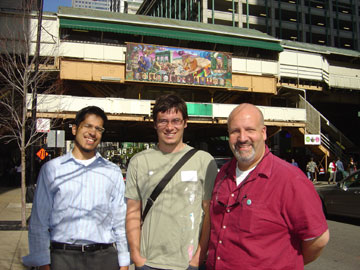Macy’s Could Learn From Syms
 "An educated consumer is out best customer..." I can still hear those words from the monotone voice on the commercials for Syms, a New Jersey-based "off-price" clothing store chain with locations in 13 states including Massachusetts and Illinois. It is not just in their commercials – it is on their signs and at the top of their Web site as well. It is something they believe in strongly, and something I believe in strongly myself in business in general. The more a customer knows about the vendor and its services, the better informed they will be in their commerce decisions. As old as the statement is, it is ever fresh.
"An educated consumer is out best customer..." I can still hear those words from the monotone voice on the commercials for Syms, a New Jersey-based "off-price" clothing store chain with locations in 13 states including Massachusetts and Illinois. It is not just in their commercials – it is on their signs and at the top of their Web site as well. It is something they believe in strongly, and something I believe in strongly myself in business in general. The more a customer knows about the vendor and its services, the better informed they will be in their commerce decisions. As old as the statement is, it is ever fresh.
I just finished reading Macy’s reaction to a story on CBS2 about their slumping sales and perception in Chicagoland since they acquired and renamed all Marshall Field’s to Macy’s. Once again, Macy’s is on the defensive, and this time its from a person other than CEO Terry Lundgren; it’s Ralph Hughes, who apparently worked for Field’s and now gets his paychecks from Macy’s. And once again, I had to laugh. Hughes said he was "stunned" and "bothered" by reactions of the growing population of former shoppers of the State Street store and others in the area. "I heard one person say the we had attitude" is another quote, and he later says, "If we had it to do over again we would do what we're doing today, which is recognizing that some people are going to be very angry with this." The attitude is there, alive and well in your statements Mr. Hughes.
Prior to Macy’s acquisition of Field’s parent May Company, there were no Macy’s stores in Chicagoland. So from the get-go, they replaced an extremely well-rooted and known store with one some only know about for their Thanksgiving parade sponsorship in New York City. They repeatedly stated it was a business decision as they were creating a national brand of stores. There was also the promise of a fresh foods market and returning Frango production to Chicago.
So what do you do when business sucks, blame your customers or clients? People with knowledge of the Windy City can tell you about the meaning of Field’s here, and you don’t have to go much farther to get hard data to back it up. About all Macy’s did was change the signs and awnings, mail out a few coupons and expect everything to be the same the next day. Almost a year later it is not. There has been no effort to reach out to customers and introduce Macy’s to the area. No media campaign, no human element, nothing. Frango mints are still not made here, and there is no market, which after the recent bug infestation of the food court may not be a bad thing. Even Chase Bank hired Mayor Daley’s brother and former Commerce secretary Bill as the head of the Midwest operations when it took over Chicago-based Bank One.
Buying a $300 sweater or handbag is not a business decision, rather it is one made by humans with real emotions involved throughout. Macy’s may not be back to square one, maybe square two, and they will go no further without changing their attitude and embracing and educating former Field’s customers.
Business • (1) Comments • PermalinkMy Take-Aways from Clients for Life
Once during an annual performance appraisal I was told I was a generalist, and as they supposedly could not sell me as an expert, I was not going to receive a raise or bonus. This came almost a month after I received a “client service” award from the same person. What was my reaction? I smiled, and thanked my reviewer as I considered it a compliment to be called a generalist, and then pointed out how the 1.5 year project I just completed needed a generalist. A month later I quit that company.
For some reason there is a perception being a generalist is bad. You see this more in medicine, as doctors want to be a specialist and not a general practitioner. I see this often in the IT world, as people want to be solely a programmer or designer or database administrator and only focus on those areas, and see the others as places on the other side of a thick wall. For those of us who consider ourselves generalists or those who don’t understand us, the book Clients for Life is a must read.
This book was written in 2000 so some of the company examples may no longer be in business, but the themes and messages ring true today. It takes a perspective beyond being solely a generalist and focuses on being an unselfish, independent, deep generalist advisor to your clients. Rather than offering specific advice or a service and focusing on a one-time deal with the hope of more business, the authors take the viewpoint that by being there, readily available to advice clients on a wide variety of topics and areas and being able to guide them to specific resources or services is equally rewarding and profitable. This can be summed up as the difference between a transaction and a relationship.
As this is how my career interests have come to form over the years, my primary take away was an affirmation of my goals. It also promotes the sense of long-term relationships in building a client base and as a result revenue. Anyone can tell you that the best source of business is repeat business from existing clients and referrals to others from them.
The book is a good read – at times it seems like it is repeating itself to make its point though. Some of the examples of people who were deep generalists had sometimes tragic or dramatic ends to their lives. Even if you don’t believe in this philosophy 100%, I would recommend reading it as it may help form some of your own thoughts on client development.
This is from The Hot Iron, a journal on business and technology by Mike Maddaloni.
Did you enjoy this? Subscribe to The Hot Iron by RSS/XML feed or Read by Email.
Book Take-Aways • Business • Diversions • (0) Comments • Permalink
Falling Prices and Crashing Servers
 File this under not communicating with your IT department about what is going on in the company.
File this under not communicating with your IT department about what is going on in the company.
On Monday, DVD rental service Netflix announced it was cutting its prices to better compete with Blockbuster's prices and in-store redemption service. Shortly afterwards netflix.com crashed and did not come back online until late Tuesday. It was said it was not due to the power outages in the San Francisco area, and though a specific reason was not given, it was reported the Web site was being updated to reflect the price changes.
Updating prices causes an entire network of Web servers to crash? Who wrote that software? When I worked for a publicly-traded company in the past, I was always on alert from marketing and investors’ relations whenever the company would announce earnings or have an investor’s call, as people would hit our Web site for the information or links. We had sufficient capacity with out Web servers and network, but hardware can always fail. This brings back memories of the crash of Wal-Mart’s Web site last year on “black Friday” or the busiest shopping day of the year the day after Thanksgiving.
Planning for such events and having the network, hardware and software capacity can prevent such events. Sure it may be expensive, but what price for such embarrassment?
Business • Technology • (0) Comments • PermalinkThe Zipcar of Bicycles
 PSFK recently reported on Velib, a new bike sharing program coming to Paris. The gist of the service is you pay an annual fee, roughly US$75, and you can use a special card to unlock access to a bike for 30-minutes of use, with longer periods available. The Web site is entirely in French, but if you don’t know the language you can see details of the bikes and special stations where the 451 bikes will be available. The service appears to borrow from car sharing services like Zipcar and I-GO.
PSFK recently reported on Velib, a new bike sharing program coming to Paris. The gist of the service is you pay an annual fee, roughly US$75, and you can use a special card to unlock access to a bike for 30-minutes of use, with longer periods available. The Web site is entirely in French, but if you don’t know the language you can see details of the bikes and special stations where the 451 bikes will be available. The service appears to borrow from car sharing services like Zipcar and I-GO.
This is a great idea! Though many people in cities around the world own bikes, they don’t tend to be in the best condition due to heavy usage on the mean streets, and the potential for theft. This service could allow for the casual bike rider to have access on-demand, or encourage others to use one. Not to mention it could free up a little storage space in an inner-city apartment.
Maybe Chicago could be its first US city?
Business • (3) Comments • PermalinkHappy Birthday likemind
This morning was the likemind coffee meetup in dozens of cities around the world. It marks one year of these coffee mornings, started by 2 gents who finally met for coffee themselves and decided to invite others.
This is the picture from the Chicago likemind, with Raza, Clay and myself. It was taken outside of Intelligentsia Coffee on Randolph at Wabash, and in the background is the Randolph L station.
By the way, Raza heard about likemind on WindyBits. Hope to see more people next month. And did I mention there is free coffee compliments of Anamoly?
Business • Technology • (1) Comments • Permalink



